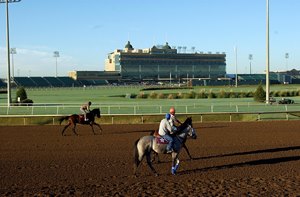Texas Racing Gets Assist from Two New Laws


Texas Gov. Greg Abbott signed into law last week two pieces of legislation that will aid the state's horse racing industry by providing a new revenue stream for purses while also providing stable funding for the Texas Racing Commission.
The law enhancing purses (HB 2463) will eventually put $25 million annually into an escrow account from a portion of the taxes collected on the sale, storage, and use of horse feed, horse supplements, horse tack, bedding and grooming supplies, and any other taxable expenditure directly related to owning, riding, or boarding horses. The law goes into effect Sept. 1.
Of the $25 million, 70% will be available to racetrack operators for purses and 30% will be available to the recognized breed registries to enhance incentive programs or for "any event that furthers the horse industry." The recognized registries include the Texas Thoroughbred Association, Texas Quarter Horse Association, Texas Arabian Breeders Association, and Texas Paint Horse Breeders Association.
"The whole idea behind this bill is to revitalize our industry, and we want to use those funds in the best way possible," said Mary Ruyle, executive director of the Texas Thoroughbred Association.
The Texas Racing Commission will ultimately decide how the funds are to be distributed between the racetracks and the associations and it won't be until the second week in September, when the commission next meets, that those rules can even be proposed. The Texas Comptroller, the Texas Department of Agriculture, and the Legislative Budget Board also get to weigh in on any proposed rules, which require at least 90 days before they can become official.
Commission spokesman Robert Elrod cautioned horsemen that working out the details is going to take time and noted no money is in the escrow fund yet.
"There are still a lot of details to work out. For one, the tax money still has to accumulate and we don't know what the timetable is on that. It could be quarterly; we just don't know yet," Elrod said. "In a month we will have a better picture but nothing will be set until the rules have been proposed and approved by the commission."
Surrounded by states with racing programs supplemented by alternate forms of gambling, the Texas racing industry has for years sought ways to effectively compete. It has been an uphill battle as indicated by the decline in wagering from $900 million in 2004 to $340.2 million in 2018, according to an industry analysis produced this year by TXP Inc. on behalf of Capital Consultants. During that same 15-year period, purses in the state fell from $32.5 million to $16.8 million.
In 2014 the Texas Racing Commission attempted to level the playing field by approving rules that would have allowed for the operation of historical gaming machines at the racetracks. A district court would later rule that the commission exceeded its authority, and a showdown with state legislative leaders opposed to what they saw as an illegal expansion of gaming led to the commission repealing those rules in 2016.
"We needed to find something that simply redirected funds to the industry," Ruyle said. "This bill is similar to one used by Texas Parks and Wildlife. It is a concept that was already out there."
As of now, the Texas horse racing industry employs approximately 1,481 people and has a total economic output of nearly $160.5 million, according to the TXP analysis. With the enhanced purses, the industry is projected to see incremental growth of around $198 million in total economic output and increased economic activity that could support an additional 1,800 jobs by 2022.
The other legislation helping the racing industry is HB 1995 that directs 1% of each simulcast pari-mutuel pool and 1.25% of each cross-species pari-mutuel pool to fund Texas Racing Commission operations.
Prior to this law, the commission has been funded exclusively through annual racetrack license fees, according to Elrod. In 2016, three operations gave up their pari-mutuel licenses—Laredo Race Park, Saddlebrook Park, and Longhorn Downs. Together those tracks were paying around $690,000 in fees annually, which the remaining active license holders had to cover.
"What the new law changes is that we are not dependent on the racetracks," Elrod said. "As it is, if we were to have one major track turn in its license, it could shut down the industry because you don't have the commission and without regulation, no one can race.
"This won't eliminate license fees, but the amount is going to change," he continued. "We don't know the exact numbers but for a larger percentage the amount is going to go down. So (the law) creates stability and it will give tracks a break."
